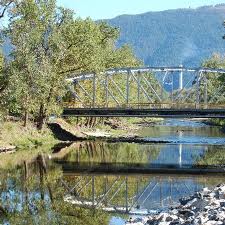Does the Kettle River range need to be resuscitated?
Administering ER to the Kettle – Granby River habitat may be exactly what the area needs. ER, or eco-system restoration, will be the topic of an upcoming forum in Grand Forks. ER is the return of a damaged ecological system to a stable, healthy, and sustainable state, often together with associated ecosystem services. To explore how this might be used in the Kettle – Granby corridor, the Granby Wilderness Society (GWS) welcomes Don Gayton, of FORREX, Tim Coleman, with Conservation Northwest, and staff from the Ministry of Environment. “I don’t know if we understand the importance of our area,” explained Jenny Coleshill, project co-ordinator of the society and a biologist. “It is probably the only place in the world where grizzly bears and rattlesnakes practically overlap and we host many species at risk. The area is a biodiversity hotspot and serves as a multi-species corridor for migration.” Don Gayton brings extensive experience in grasslands, dry forest ecology, fire-maintained ecosystems and disturbance ecology. Previous to joining FORREX in 1998, Gayton worked as range ecologist for the B.C. Ministry of Forests, as well as provincial range specialist in Saskatchewan. He has an extensive writing portfolio of technical bulletins, books and popular scientific articles. Putting complex scientific material into clear, understandable and engaging prose is Gayton’s specialty. Disturbance is a key ecosystem process, and much of Gayton’s professional work has revolved around the twin disturbance processes of fire and grazing and their impacts on the dry, low elevation forests and grasslands of British Columbia’s Southern Interior. Tim Coleman has been an environmental activist since 1971, and served as Kettle Range Conservation Group executive director from 1993 to 2004. He is currently a steering committee and executive committee member of the Wild Washington Campaign. Coleman was named an Environmental Hero by the Washington Environmental Council in 1998 for his work on the Colville National Forest. A Vietnam-era navy veteran, he enjoys mountain climbing, white water rafting, telemark skiing, and gardening. Coleman and his wife Sue have lived for more than 20 years in their handmade solar-powered log home on 80 forested acres in northern Ferry County.
The GWS received seed funding from the Habitat Conservation Foundation (HCF) to establish partnerships to move forward with projects. Their hope is to submit a full proposal for a multi-year project this year based on input from this forum. The HCF is a funding source that supports conservation projects for fish and wildlife across the province of BC; its contributions have had huge beneficial impacts. The Kettle River Range into the Granby River Corridor was one of five critical corridors between Washington and B.C. for multiple species identified in a mapping project by the Washington Wildlife Habitat Connectivity Working Group. Fire suppression, roads, introduced species and many other related human activities impact wildlife and habitats. “We can not rely on the government alone to protect these habitats that provide us with critical ecosystem services,” said Coleshill. “We are asking all interested groups, key individuals, and members of the public to attend an evening to learn more about ER and how we can move it forward in the Kettle Granby Corridor.”
The forum is open to anyone interested and will take place on Wednesday, Mar. 23 at the Slavonic Seniors Hall at 6:30 p.m.






















